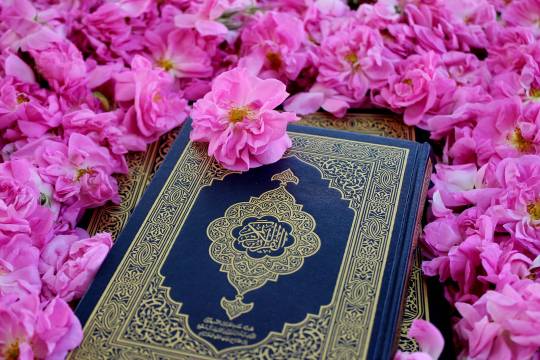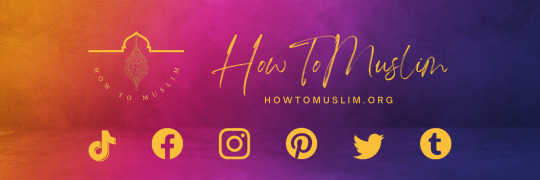Who except Allāh can give you peace. Has the world ever been able to satisfy your heart?
Don't wanna be here? Send us removal request.
Text
لا إلَهَ إلاَّ اللهُ وَحْدَهُ لا شَريْكَ لَهُ، لَهُ المُلكُ، ولَهُ الحَمدُ، وَهُـوَ عَلَى كُـلِّ شَيءٍ قدير
“There is no god but Allah alone, without any partner. To Him belongs the dominion, and to Him belongs all praise, and He is capable of everything.”
190 notes
·
View notes
Text
أَوَلَمْ يَرَ الْإِنسَانُ أَنَّا خَلَقْنَاهُ مِن نُّطْفَةٍ فَإِذَا هُوَ خَصِيمٌ مُّبِينٌ
Does man not see that We created him from a [mere] sperm-drop - then at once he is a clear adversary?
وَضَرَبَ لَنَا مَثَلًا وَنَسِيَ خَلْقَهُ ۖ قَالَ مَن يُحْيِي الْعِظَامَ وَهِيَ رَمِيمٌ
And he presents Us an example and forgets his [own] creation. He says, "Who will revive bones after they’ve disintegrated?"
قُلْ يُحْيِيهَا الَّذِي أَنشَأَهَا أَوَّلَ مَرَّةٍ �� وَهُوَ بِكُلِّ خَلْقٍ عَلِيمٌ
Say, "Gives them life the one who made them the first time; and He is, of all creation, Knowing."
20 notes
·
View notes
Text
Indeed, I am Allāh. There is no deity except Me, so worship Me and establish prayer for My remembrance.
Surah Taha Ayah 14
Reciter: Ahmed Khedr
23 notes
·
View notes
Text

Imagine the punishment that awaits them in the hereafter subhan’allah ‼️
May Allah protect all of us from the hell fire and guides us in the right path 🤲🏼
12 notes
·
View notes
Text
اللهم ارزقنا يقينًا تهون به علينا مصائب الدنيا
Ya Allah, grant us such certainty (in faith) that will make the hardships of this world easier for us.
310 notes
·
View notes
Text
“Everything comes at the time that Allāh sees it proper for us, and our limited insight is ignorant about that.”
255 notes
·
View notes
Text

BUT DID YOU CONGRATULATE YOURSELF ON THE PROGRESS THAT NO ONE KNOWS ABOUT? HONOR YOURSELF.
894 notes
·
View notes
Text

- تَشبَهين فَلسطين بشكل مُخيف
- ماذا تَقْصد؟
- قَوية ، وجَميلة ، وألف عَدو يتمَناكِ
1K notes
·
View notes
Text

Allah is happier with the repentance of His servant than one of you who loses his camel in a barren desert and then finds it unexpectedly."
— Sahih Muslim
767 notes
·
View notes
Text
Why The Quran Asks Us To Ponder

Islam emphasises reflection, urging believers to use reason and contemplation to grasp the magnificence of creation and the purpose of life. The Quran, revealed to be a guidance for humanity, frequently calls us to use our intellect and ponder over the signs of Allah’s creation, encouraging deeper faith, gratitude, and understanding.
Below, we explore the Quran’s repeated call to contemplation, the signs in Allah’s creation, and the wisdom behind this reflection.
The Call to Ponder: A Divine Invitation
The Quran mentions the act of pondering 13 times, inviting readers to think beyond surface realities. Reflection in Islam is not just intellectual but also spiritual, helping people develop a connection with Allah by appreciating the beauty and precision of His creations. The Quran often presents questions that awaken hearts and minds:
“Do you not think?” (Surah Al-Baqarah, 2:44)
“Will you not then ponder?” (Surah Al-Baqarah, 2:219)
“Do they not reflect upon the Quran?” (Surah An-Nisa, 4:82)
“Will they not contemplate within themselves?” (Surah Ar-Rum, 30:8)
“So reflect, O people of insight.” (Surah Al-Hashr, 59:21)
“Do they not contemplate the Word?” (Surah Al-Mu’minun, 23:68)
“Do they not reflect upon the stories?” (Surah Yusuf, 12:111)
“Will you not ponder?” (Surah Al-Anaam, 6:50)
“In that are signs for those who reflect.” (Surah Ar-Rum, 30:21)
“For those who think and reflect…” (Surah Al-Zumar, 39:42)
“Do they not reflect on what Allah has created?” (Surah Al-A’raf, 7:185)
“Have they not traveled through the land to reflect?” (Surah Al-Hajj, 22:46)
“Do they not reflect on the heavens and the earth?” (Surah Ghafir, 40:57)
The Quran draws our attention to the vastness and intricacy of the universe as signs of Allah’s creative power:
“Indeed, in the creation of the heavens and the earth, and the alternation of the night and the day, are signs for those of understanding.” (Surah Aal-Imran, 3:190)
From the sky to the earth, the Quran teaches that every element of nature reflects divine wisdom. The harmony in ecosystems, the precise orbit of celestial bodies, and the perfect design of living beings all bear witness to Allah’s knowledge and control.
Prophet Muhammad (ﷺ) said: “Think about the creation of Allah, but do not think about the essence of Allah, for you will never be able to comprehend it.” (Sunan Abi Dawood, 4726)
Islam invites us to appreciate Allah’s signs but warns against delving into matters beyond human understanding, such as Allah’s essence.
Gratitude and Faith through Reflection
Contemplation naturally leads to gratitude. When we reflect upon the intricacies of creation, we recognizse our dependence on Allah’s blessings and mercy, increasing our faith and humility. The Quran says:
“If you were to count the favours of Allah, you could never enumerate them. Indeed, Allah is Forgiving and Merciful.” (Surah An-Nahl, 16:18)
Reflection transforms routine experiences — such as observing the sunrise or feeling the breeze — into moments of spiritual awareness. Gratitude, in Islam, is not merely verbal but is shown through worship, kindness, and responsible stewardship of the earth.
Islam’s Encouragement to Seek Knowledge
Islam’s emphasis on reflection fosters a deep love for learning and personal growth. The first revealed words of the Quran were:
“Read in the name of your Lord who created.” (Surah Al-Alaq, 96:1)
This call to read, understand, and seek knowledge underscores the importance of intellectual development in Islam. The Prophet Muhammad (ﷺ) said:
“Seeking knowledge is an obligation upon every Muslim.” (Ibn Majah, Hadith 224)
The act of pondering leads to acquiring knowledge, developing moral character, and fulfilling our purpose as vicegerents of Allah on earth.
Islamic Science and Innovation: A Legacy of Enlightenment Exploring the Golden Age and Pioneering Contributions in Astronomy and Medicinemedium.com
The Quran and Sunnah guide believers to reflect on both scripture and creation, allowing them to develop a profound connection with Allah. Through contemplation, one not only understands life’s purpose but also appreciates the beauty, wisdom, and mercy of God. This reflection leads believers to live mindfully, with gratitude and humility, striving to embody the teachings of Islam.
Emphasis of Good Character and Manners in Islam Islam is not just a set of rituals or beliefs; it is a comprehensive way of life that emphasises the importance of good…medium.com

Learn more about Islam here: https://www.howtomuslim.org
47 notes
·
View notes






